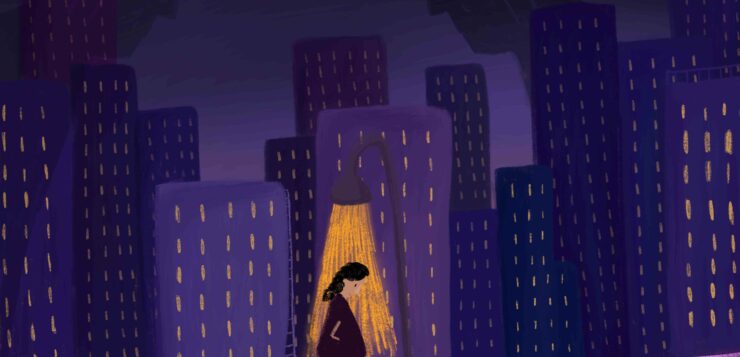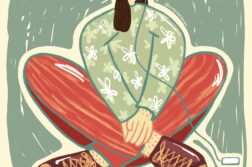“Why didn’t you say something?”
When I opened up about my experience with domestic violence, that was the first question people asked me. 3 years later, it’s still the question I most commonly receive. I’ve never been offended by this question because I get it. We all want to believe that our voices have power, that we would say something and therefore prevent ourselves from being abused.
But while it’s true that speaking up can affect change, it’s also not always that simple. And if we want to understand why so many victims of domestic violence are reluctant to voice their experiences, we have to begin by unpacking the smothering cycle of silence and shame that is intrinsic to abuse.
It’s been said that the onset of domestic violence is similar to slowly boiling a frog in a pot. If you were to toss a frog into boiling water straight away, he’d hop right out in an instant. But if you put him in a pot of room temperature water and slowly turn the heat up by degrees, by the time he notices, it’s already too late.
For me, and for many other survivors of abuse, that’s exactly how it happened. When the person you fall in love with is charming, funny, and attentive from the outset, that’s what you notice first. In that early, hazy phase of love, you never for one moment believe that person will hurt you.
It’s only when the mask falls that you realize it’s too late. And by the time you realize that early bliss was nothing more than love-bombing, the pain is almost too much to bear. If you think about domestic violence through the lens of a horror movie, then this would surely be the moment when you realize that your Airbnb has a torture chamber in the basement or the kindly driver giving you a ride is secretly a serial killer.
That’s always the moment when people run for the hills, right? The moment when you call the police or scream for help. But characters in horror movies rarely seem to feel trapped by the weight of their own shame. They rarely waste time wondering why they never saw the warning signs or asking themselves how they could have been so blind. They don’t look at the creepy lair in the basement and ask themselves if there’s still a chance they can make this work.
But that’s exactly what happened to me. By the time my abuser showed her true colours, I couldn’t bear to admit that the person I fell in love with had never existed. I could have told a friend. I could have confided in my mum. But in my just-turned-18- year-old mind, it was impossible to say, “Actually, she turned out to be a gaslighting narcissist” without damning myself as a loser stupid enough to be hoodwinked.
At 18, I was naive enough to believe that it was easier to stay. And after 5 years of being abused, I was convinced that no one would believe me. Why would they, when I told everyone how happy and in love I was? Why would they, when I jumped through hoops to cover for her, to hide what she did to me, to convince other people she was normal and we were happy? After 5 years of psychological manipulation and emotional abuse, I wasn’t even sure if I believed myself.
And yet I’m one of the lucky ones. I’m the frog who noticed the water was boiling and jumped out seconds before being cooked. Eventually, the abuse escalated and I took my first tentative steps toward getting out, building a support network, and opening up to others.
Talking about my experience— even with people who loved and supported me— was a slow and painful process. I felt that if I talked about it, the abuse would truly feel real. If it became real, I would have to admit to myself— and to others— what I had really gone through and how it had changed me.
Those aren’t easy things to admit to yourself, much less to other people. Working past those fears involves a degree of raw, excruciating authenticity that feels a bit like cauterising a wound without pain relief. It’s one of those things that hurts so much, you wonder if you’ll be able to survive the pain. And yet you have to do it because it’s the only way to save your life.
I never imagined a future in which I could talk about my experience with abuse, much less write about it. But the slow, painful steps I took toward opening up with my support network paved the way for me to feel confident enough to share my story with others. And when I think back on my initial struggle to speak up, it reminds me that every time someone breaks that cycle of shame and silence, it gets a little easier for others. It makes it easier for other survivors to put a name to their pain and see light at the end of the tunnel. Our voices do have power, even if speaking up sometimes feels impossible.
If you or someone you love is being abused, I hope my story will remind you that there is a way out. You have a future of hope and happiness ahead of you and there is no shame in sharing your story.




